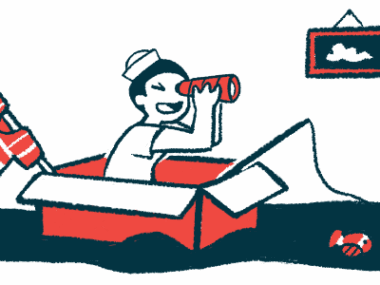The Power of Proximity to Ease Burdens
Written by |

Over the years, I’ve grown more reliant on friends, especially those who live with some sort of disability. Of course, I treasure all my friendships, but there is a bond between disabled folks that transcends most relationships. It’s a special kind of knowing, a wordless understanding that is reassuring.
I was scrolling through Tumblr the other day and came across a post that perfectly encapsulates what it is to be in community with disabled people. The Tumblr post summarizes a 2008 study in the U.K., published in the Journal of Experimental Social Psychology, and notes that “perceptions of task difficulty are significantly shaped by the proximity of a close friend.”
In the Tumblr post’s description of the study, college students stood “at the base of a hill while carrying a weighted backpack … to estimate the steepness of a hill. Some participants stood next to close friends whom they had known a long time, some stood next to friends they had not known for long, and the rest stood alone during the exercise. The students who stood with friends gave significantly lower estimates of the steepness of the hill than those who stood alone. Furthermore, the longer the close friends had known each other, the less steep the hill appeared to the participants involved in the study.”
I immediately thought of my writer friends, Twitter mutuals, and Discord pals, who know firsthand how difficult it is to write a book. Communities like National Novel Writing Month (NaNoWriMo) capitalize on this idea of proximity. Writing 50,000 words in 30 days, as NaNoWriMo asks participants to do, is a large request, but it becomes significantly more achievable when partnering with a friend or a regional team. It shows that participants are not alone, and that solidarity helps to bolster writers in moments of difficulty.
I also thought of my SMA friends Sherry Toh and Kevin Schaefer, and countless others across the globe. Our shared life experiences make up for our lack of proximity. I know that when I complain to Sherry about caregiving and independence, she’ll understand my frustration; I know that Kevin can empathize with my health woes, from chronic pain to SMA-related fatigue.
Sometimes, all they can do is listen. But it’s their ability to bear witness that affects my resilience. The weighted backpack doesn’t feel so heavy when I’m in the presence of people with backpacks of their own.
The same goes for counseling. Therapists may not have experience with SMA, for example, or a specific combination of mental illness and physical disability. But it’s their presence — their willingness to walk alongside you as you wrestle in the mud of life — that reduces feelings of isolation and helplessness. They may not know the exact weight of your backpack, but they can empathize enough to say, “That looks really heavy. I’m sorry you have to carry this burden. Do you mind if I help you up the hill?”
I recently returned to therapy after a couple of years off. Given my education in mental health counseling, you’d think I’d have expected the relief that comes with the proximity of a support figure. But it caught me off guard. I told my therapist what was going on — the stress and the anxiety, the nagging self-doubt — and immediately felt refreshed.
My situation hadn’t changed. I was still facing a slog. But the incline of the hill — the difficulty I assigned to the climb — softened in the presence of people who had my back.
I went years without community. I was convinced that I could thrive on my own. And maybe I was right! But I can genuinely say that given the choice, I would rather stand at the base of a hill with backpackers like me.
We may not be carrying the same things. We may be hiking for different reasons. (Compare my therapist, who spends her days helping people heal, with Sherry, who was lucky — or perhaps unlucky — enough to be born with a defective SMN1 gene.) But the proximity persists, and it is that presence, that community, that fortifies us when our spirits falter and our muscles cry uncle.
With the pandemic waning here in the U.S., I am looking to the future, in all its glorious uncertainty. I’m dreaming of independence: apartments with friends, train trips to Chicago, big, scary, I-don’t-know-if-this-is-even-possible things.
The hill is steep and littered with potholes, because I am still a disabled woman in an able-bodied world. I have 25 years worth of baggage in my backpack weighing me down, tricking me into staying at the base of the hill.
But I’m not alone. And neither are you. We are surrounded by backpackers, and we are hiking the hill together.
As that Tumblr post noted, “the world looks less difficult when standing next to a close friend.”
***
Note: SMA News Today is strictly a news and information website about the disease. It does not provide medical advice, diagnosis, or treatment. This content is not intended to be a substitute for professional medical advice, diagnosis, or treatment. Always seek the advice of your physician or other qualified health provider with any questions you may have regarding a medical condition. Never disregard professional medical advice or delay in seeking it because of something you have read on this website. The opinions expressed in this column are not those of SMA News Today, or its parent company, Bionews, and are intended to spark discussion about issues pertaining to spinal muscular atrophy.




Leave a comment
Fill in the required fields to post. Your email address will not be published.